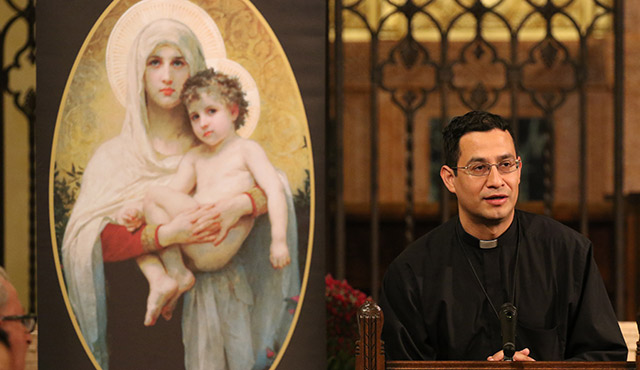HUNTINGTON, N.Y. (CNS) — As Jesus called his disciples in many ways, vocation directors and seminary faculty must walk with candidates and students to understand and meet their individual needs as they discern their call to priesthood, according to the bishop of Orlando, Florida.
Diocesan policies and seminary practices should accommodate varying expressions of prayer and cultural celebrations, particularly in the diverse and growing Hispanic Catholic community, said Bishop John G. Noonan.
He addressed the National Conference of Diocesan Vocation Directors Hispanic workshop Oct. 29 at the Seminary of the Immaculate Conception in Huntington.
He said Hispanics comprise 42 percent of the Catholic population in the United States, and more than 50 percent of Catholics under 35, but only 15 percent of seminary students. “What are we doing wrong?” he asked.
Bishop Noonan said differences among Hispanic cultures should be recognized by the church, and vocation directors should point to the example of Pope Francis as a Spanish-speaking priest and leader.
The Irish-born bishop described his own bilingual education at two seminaries in the Archdiocese of Miami as a cultural eye-opener. The student bodies included Cuban immigrants and non-Hispanics. He said the joyful, physical, noisy liturgies and celebrations “were kind of extraordinary for an Anglo. We never express our feelings in Ireland,” he quipped.
“People clapped at Mass, people swayed, people talked. It was all foreign to me. I embraced it and thoroughly enjoyed it,” Bishop Noonan said.
He drew on personal experience as an immigrant seminarian, longtime rector of his seminary alma mater and his nine-year tenure as director of priestly life and ministry for the Archdiocese of Miami to encourage vocation directors to accompany candidates on their journey of discernment and development.
Bishop Noonan said it’s not necessary to speak the language or know the culture, but priests must care for their people, reach out and welcome them. Pastors at primarily Anglo parishes that celebrate a single weekend Mass in Spanish need to understand the Hispanics “are not just using the church, it’s their parish, too,” he said.
“Food, music, and folkloric dancing are important to a culture and they tear down barriers,” Bishop Noonan said. “The experience of our faith is so limited sometimes that we don’t understand what it is to celebrate multiculturalism,” he said.
Vocation directors and seminary faculty must spend time getting to know candidates and develop appreciation and respect for every student. “Each has a story to tell. You need to know as much about them as you can to set them up for success,” Bishop Noonan said.
“Don’t let laws, rules and regulations overcome you,” he said. Learning disabilities and a weak educational background are surmountable obstacles that can be addressed in houses of formation and mitigated with support throughout the seminary years.
“We need to walk with our young men and understand what they need. We need to give them the hope that it’s important to let Christ into their life,” he said. “Don’t give up!”
The two-day workshop included representatives from 15 dioceses and will be repeated in Florida, California and Texas, according to Rosemary C. Sullivan, executive director of the National Conference of Diocesan Vocation Directors.
Sullivan said her organization was tasked by the U.S. Conference of Catholic Bishops’ Committee on Clergy, Consecrated Life and Vocations to help dioceses increase the number of Hispanic seminarians by 25 percent over three years.
The workshop is the beginning of a much-needed conversation to help vocation directors improve their outreach to Hispanic youth, she said. “The mission for now is to tell Anglo vocation directors, ‘You can do this. You can reach out to these young people,’” Sullivan said. “The best advice is to be present and know who the leaders are.”
The small number of seminarians relative to the Hispanic presence in the church “symbolizes a void. Are there young men in the Hispanic community who have a calling and don’t know how to internalize it or pray with that?” Sullivan asked. “The role of the vocation director is to be open to the movement of the Holy Spirit.”
Father Jorge Torres, vocation director for the Orlando Diocese, said the workshop would “remind priests that the charism is within them” and their missionary hearts will be moved by Jesus to go out of their comfort zone and meet people on the fringes.
“This is not going to be harder than when Christianity came to the Americas,” he said.
During the workshop, the Cross of the Encuentros was displayed in the seminary chapel. The 5-foot-tall wooden cross symbolizes the journey of faith of Latino Catholics in the United States and was blessed by Pope Francis in Philadelphia Sept. 26.
Encuentro is a three-year ecclesial process convened by the Catholic bishops of the U.S. It includes missionary activity, consultation, leadership development and pastoral discernment and will culminate in the Fifth National Encuentro on Hispanic ministry in 2017. The cross will be venerated in parishes, dioceses and episcopal regions throughout the country during local Encuentro processes.

